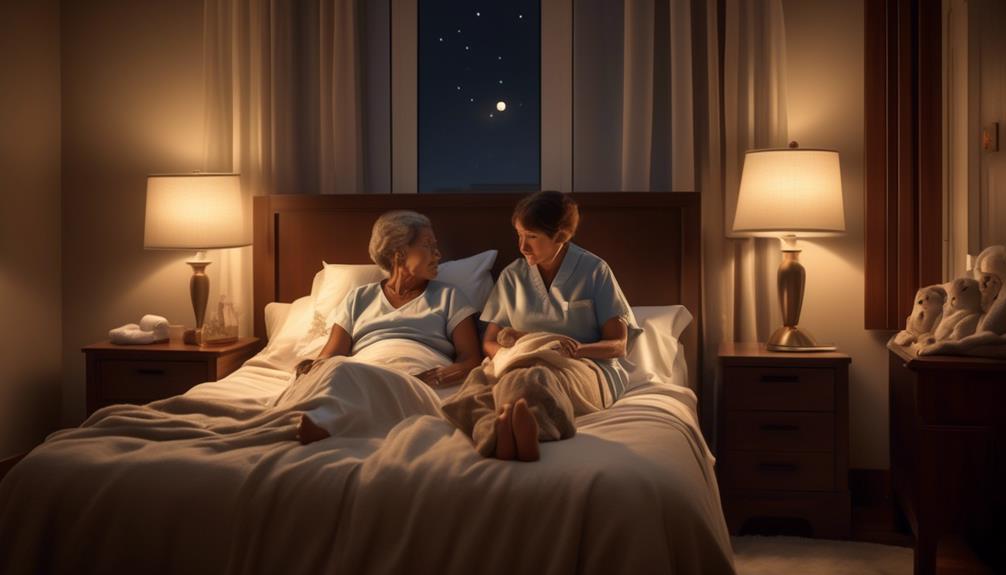When considering hospice care, many people wonder if it can offer round-the-clock assistance at home. Hospice care aims to provide comfort and support during difficult times, and the extent of care available at home may be unexpected for some individuals.
Understanding the nuances of hospice care can shed light on the possibilities and limitations of in-home support for patients in need. Let's explore how hospice navigates the delicate balance of meeting patients' needs within the scope of their services.
Key Takeaways
- Continuous home care offers 24-hour daily support during acute symptom management.
- 24-hour hospice care prevents unnecessary hospitalizations, ensuring comfort at home.
- In-home care supplementation reduces family caregivers' daily responsibilities.
- Medicare eligibility for 24-hour care includes coverage for most hospice services.
Levels of Hospice Care
In hospice care, individuals can receive support at various levels, including Routine care, General inpatient care, Respite care, and Continuous home care. Continuous home care is a crucial aspect of hospice, providing 8 to 24 hours of support daily during crises or acute symptom management. This level of care ensures that patients' needs are met round-the-clock, offering comfort and assistance when they need it most. Hospice care is typically prescribed for individuals with a life expectancy of six months or less, aiming to enhance their quality of life during the end-of-life journey.
Continuous home care plays a vital role in addressing the evolving needs of patients as they navigate the challenges of their illness. By offering 24-hour care at home, this level of hospice care not only supports the patient but also provides reassurance to their families. It allows for immediate interventions and personalized attention, tailored to enhance the patient's comfort and well-being during this sensitive time. Through Continuous home care, hospice teams strive to create a peaceful and supportive environment for both the patient and their loved ones.
Need for 24-Hour Hospice Care

Understanding the necessity for continuous 24-hour hospice care at home is crucial in providing comprehensive support for patients with acute symptoms requiring constant monitoring and assistance. When patients face end-of-life symptoms that demand continuous care, 24-hour hospice services become essential.
Hospice professionals, equipped to address complex medical needs, offer around-the-clock support to manage symptoms effectively. Through continuous care services, patients receive not only medical assistance but also the emotional support needed during challenging times.
The goal of 24-hour hospice care at home is to ensure patients can remain in familiar surroundings while receiving comprehensive care and symptom management. This level of care aims to prevent unnecessary hospitalizations by providing adequate support and monitoring throughout the day and night.
In-Home Care Supplementation
When considering comprehensive support for patients receiving hospice care at home, it's important to recognize the valuable role that in-home care services play in supplementing their needs. In-home care services can provide crucial assistance with daily tasks, lifestyle support, and help alleviate caregiver stress for family members. Here are some key points to highlight the significance of in-home care supplementation:
- Enhanced Quality of Life: By assisting with household tasks and daily activities, in-home care professionals contribute to improving the overall quality of life for patients and their families during the end-of-life journey.
- Relief for Family Caregivers: In-home care services allow family caregivers to focus on spending meaningful time with their loved ones, knowing that essential tasks are being taken care of by trained professionals.
- Minimized Daily Responsibilities: Combining hospice and in-home care helps reduce the burden of daily responsibilities on family members, enabling them to better support their loved ones emotionally and mentally.
Limitations of Hospice Care at Home

Acknowledging the challenges faced by families and caregivers in providing round-the-clock care, it becomes evident that hospice care at home has inherent limitations that necessitate further consideration. While hospice organizations strive to offer comprehensive end-of-life care, including physical, emotional, and spiritual support, they can't provide 24-hour care at home for the entire duration due to constraints in resources and staffing.
Patients approaching the end of life may require continuous care in an institutional setting, such as an inpatient hospice facility, where around-the-clock monitoring and assistance can be readily available.
When individuals reach a stage where they need constant supervision that surpasses what can be managed at home, alternative end-of-life care options might be recommended. Providing adequate end-of-life care in a home environment can be overwhelming for families and caregivers, both physically and emotionally. It's crucial to seek guidance and support from healthcare professionals and others who've navigated similar circumstances to understand and address the limitations of hospice care at home effectively.
Medicare Coverage for 24-Hour Care
To access 24-hour hospice care through Medicare, patients must meet specific qualifying conditions. When considering Medicare coverage for 24-hour care, it's essential to understand the following:
- Eligibility Requirements: Patients must be eligible for Medicare Part A and have a certified terminal illness with a life expectancy of six months or less.
- Co-Payments: While Medicare covers most hospice services, patients may still be responsible for small co-payments for prescription drugs and respite care.
- Location of Care: Medicare may cover 24-hour hospice care for patients who are homebound or residing in nursing homes or other care facilities.
Navigating Medicare coverage for 24-hour hospice care can be complex, but it's crucial to ensure that patients receive the support they need during such a challenging time. Understanding the conditions, possible co-payments, and where the care can be provided is key to making informed decisions about hospice care under Medicare.
Frequently Asked Questions
What Is Continuous Home Care Regarding the Hospice Benefit?
Continuous home care in hospice is a vital level of support offering 8 to 24 hours of assistance daily, particularly during acute symptom management like intense pain or breathing issues. This care is covered by Medicare and ensures patients can stay home comfortably, avoiding unnecessary hospital trips.
Nurses provide round-the-clock medical support, focusing on end-of-life symptom management, comfort, and emotional well-being, allowing individuals to receive necessary care in a familiar environment.
What Is Usually Not Included in Hospice Care?
Typically, hospice care doesn't include round-the-clock nursing or continuous monitoring. Instead, it focuses on providing intermittent visits and support for comfort and symptom management.
While hospice offers comprehensive care, it may not provide the constant medical supervision needed for 24-hour care at home. Hospice prioritizes quality of life and comfort measures, which differ from the continuous care required in other settings.
Does Medicare Pay if the Patient Is in Hospice?
Medicare typically covers hospice care for eligible patients. It provides essential support during a challenging time. This coverage extends to various services that aim to enhance comfort and quality of life.
Our team ensures that patients receive the necessary care and attention while respecting their dignity and individual needs. We strive to deliver compassionate care in line with Medicare guidelines to support both patients and their families.
How Many Times a Week Does Hospice Come?
We provide care tailored to the patient's needs, adjusting visits as necessary.
The hospice team typically visits for short durations, less than an hour each time.
For acute situations, we offer continuous care, available 8 to 24 hours a day.
Our goal is to ensure patients receive the right level of support at home.
It's all about meeting individual requirements with compassion and attention to detail.
Conclusion
In conclusion, while hospice care at home can provide invaluable support for patients in their final days, it may not always cover 24-hour care. It's important to consider alternative options like inpatient hospice care for round-the-clock assistance.
Remember, hospice professionals work tirelessly to ensure comfort and dignity for patients, but they can't be everywhere at all times. Let's not forget the incredible dedication and compassion they bring to their work, making a world of difference for those they care for. Their efforts extend beyond just medical care; they also provide emotional and spiritual support to both patients and their families during challenging times. Many may wonder, *who covers hospice care costs*—fortunately, hospice care is often covered by Medicare, Medicaid, and most private insurance plans, making it accessible to those in need. This support system allows hospice professionals to focus on delivering quality care without added financial burdens on families.









